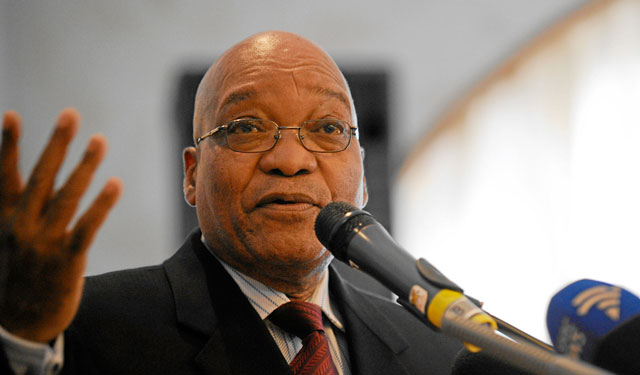
President Jacob Zuma contradicted senior members of the ANC on Friday in calling for the constitution to be changed to ensure greater access to land for the nation’s black majority and indicating that the government may consider expropriating land without paying for it.
“We must undertake a pre-colonial audit of land ownership, use and occupation patterns,” Zuma said in an address to traditional leaders in Cape Town on Friday, referring to the time before European settlers arrived in the country.
“Once the audit has been completed, a single law should be developed to address the issue of land restitution without compensation. The necessary constitutional amendments would then be undertaken to effect this process.”
Zuma’s comments directly contradict the stance taken by ANC lawmakers, who have said land reform can be effected within the confines of the existing constitution.
Zuma is due to step down as ANC leader in December and as president in 2019. Dissent within the ruling party is growing after it had its worst yet showing in election in last year’s municipal vote, losing control of major cities including Johannesburg, the commercial hub, and Pretoria, the capital.
The votes of at least two-thirds of the nation’s 400 lawmakers will be needed to amend the constitution. The ANC controls 62% of the seats in parliament. The Economic Freedom Fighters, the nation’s second biggest opposition party with 6% of the seats, has called for land expropriation without compensation.
“Blaming the constitution for the embarrassingly slow pace of land reform is both disingenuous and scapegoating,” Jackson Mthembu, the ANC’s chief whip in parliament, said in a Twitter posting Friday. The existing “constitution is more of an enabler for land reform than a barrier. We failed to take advantage of its provisions.”
Zuma said land reform would continue under existing laws until changes were made and the government didn’t support chaos and illegal land grabs.
“Identifying constitutional blockages as the reason for the slow pace of land restitution gives Zuma and his allies much more political mileage than say, using more practical tools,” Ralph Mathekga, a political analyst at the Mapungubwe Institute for Strategic Reflection, a Johannesburg-based research group, said by phone.
The dissent displayed by people like Mthembu showed some ANC leaders were worried that the calls for constitutional changes could be symptomatic of a campaign “much more wider than the assault on the constitution” and spread to the weakening of the courts as the custodians of the constitution, he said.
The government in 2014 said it’s considering buying half of every farm and would deposit payments for that land in a trust that will finance production as it seeks to change land-ownership patterns that were skewed in white people’s favour during apartheid rule, which ended in 1994.
“The president has gone rogue on land reform, contradicting both his own cabinet and the ANC’s parliamentary caucus, and he should be reined in,” Mmusi Maimane, the leader of the main opposition Democratic Alliance, said by e-mail. “It is corruption and bad policy that have been the greatest inhibitors to land redistribution and reform.” — (c) 2017 Bloomberg LP




